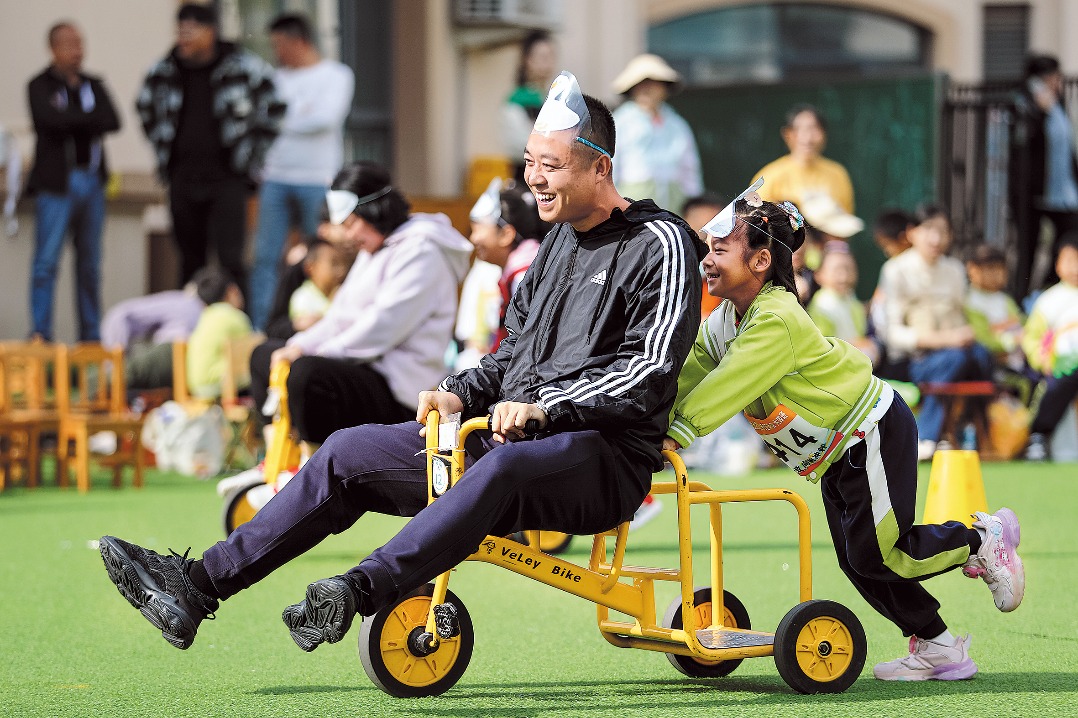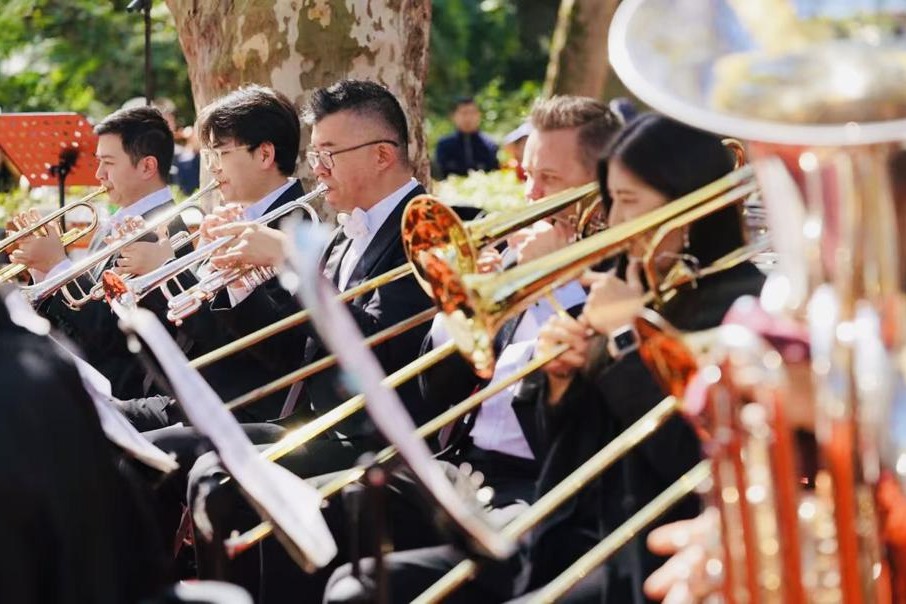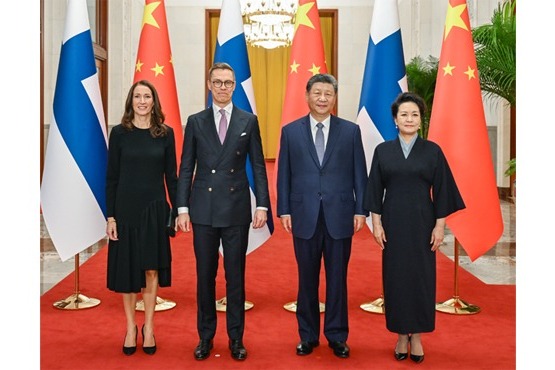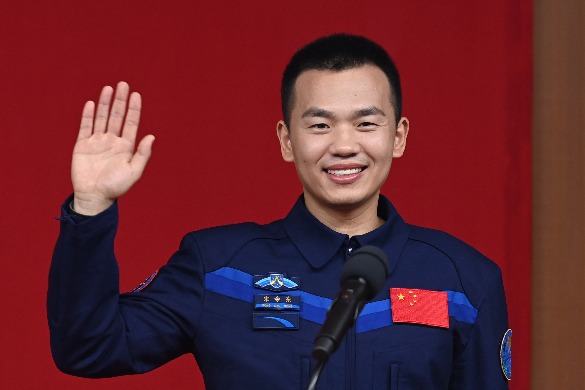Cambodia still reaps benefit from Xi's visit
Relations, cooperation between nations strengthened in all sectors, at all levels

Chea Munyrith, then director of the Confucius Institute of the Royal Academy of Cambodia, recalled that when President Xi Jinping arrived in Phnom Penh for a state visit to Cambodia on Oct 13, 2016, the institute's teachers and students were among the welcoming crowds.
"President Xi's visit was celebrated across the country," said Chea, who is now president of the Cambodian Chinese Evolution Researcher Association.
During his state visit, Xi held talks with Cambodian King Norodom Sihamoni and then prime minister Hun Sen, agreeing that the two countries should continue to be "highly trusted friends, loyal partners, and a community of shared future", said Chea, who has worked on the translation of the Khmer-language edition of Xi Jinping: The Governance of China.
While the two countries signed 31 cooperation documents during Xi's visit, the trip also demonstrated closer people-to-people ties.
As planning and project director of Cambodia's Civil Society Alliance Forum, Chea has been working with Chinese nongovernmental organizations for years on projects to improve people's livelihood in Cambodia's rural areas.
He cited the two countries' collaboration on poverty alleviation and healthcare, such as the Cambodia-China Friendship Village Project for Poverty Alleviation, the Cambodia-China Friendship Preah Kossamak Hospital, and the China-Cambodia Love Heart Journey, a program that provides free surgery for Cambodian children with congenital heart disease.
In addition, China's support for Cambodia with advanced equipment to clear all land mines and achieve the goal of being mine-free by 2025 has helped ease people's safety concerns, Chea said.
Cambodia is among the nations worst affected by land mines, with an estimated 4 million to 6 million mines and other unexploded munitions left behind during three decades of war and internal conflicts that ended in 1998.
Since 2018, China has helped Cambodia clear more than 100 square kilometers of minefields and about 78,000 land mines, as well as explosive remnants of war. This has benefited over 1.5 million Cambodian people, according to Xinhua News Agency.
Kin Phea, director-general of the International Relations Institute of Cambodia, an arm of the Royal Academy of Cambodia, said that since President Xi's visit to Cambodia eight years ago, "the relations and cooperation between Cambodia and China have broadened and strengthened in all sectors and at all levels".
In a joint communique issued during Xi's visit, China and Cambodia had agreed to raise bilateral trade to $5 billion by 2017.
In 2023, a year after the China-Cambodia free trade agreement and the Regional Comprehensive Economic Partnership agreement took effect, the total imports and exports between China and Cambodia exceeded $14.82 billion, according to China's General Administration of Customs.
China has been Cambodia's biggest trading partner for 12 consecutive years. It is also the largest source of foreign direct investment for Cambodia, accounting for two-thirds of the total FDI in 2023, according to the Council for the Development of Cambodia.
Neak Chandarith, director of the Cambodia 21st Century Maritime Silk Road Research Center, said that Cambodia has been supportive of China-proposed initiatives such as the Belt and Road Initiative, because it sees the BRI as a catalyst for sustaining high economic growth.
In 2019, Cambodia became the first country to sign an action plan to build a community of shared future with China.
Last year, when China and Cambodia celebrated the 65th anniversary of diplomatic relations, the two countries agreed to deepen partnership under the "diamond hexagon" cooperation framework that focuses on six priority areas — politics, production capacity, agriculture, energy, security, and people-to-people and cultural exchanges.
Cambodia's participation in China-proposed initiatives has facilitated the country's integration into the Lancang-Mekong Cooperation and ASEAN-China cooperation frameworks, as well as other regional frameworks, Neak said, noting that this integration enhances Cambodia's regional influence and promotes economic cooperation.
With this year designated as the China-Cambodia People-to-People Exchange Year, Um Vuty, founder and chairman of the Association of Cambodian Students in China, said he believes the younger generation will play a key role in deepening bilateral cooperation and mutual trust.
When Xi visited Cambodia in 2016, Um Vuty was pursuing a master's degree at China University of Geosciences in Beijing. Witnessing the close exchanges between Cambodia and China, he founded his association in 2017 to help young people from Cambodia study and work in China.
Um Vuty is now a government employee and also president of the Cambodia-China Youth Relations Association. "The things I learned in China have laid a solid foundation for my career and supported me in many tasks," he said.
Following President Xi's visit in 2016, "there are now more Confucius Institutes and Chinese language schools in Cambodia, so young Cambodians can learn Chinese and use it for research and communication, and even in their own businesses", Um Vuty said.
He added that he hopes to create more opportunities for Cambodian and Chinese students to communicate with one another.
In May, in a clear sign of the strengthening bilateral bond, Phnom Penh's third ring road was renamed Xi Jinping Boulevard. Cambodian Prime Minister Hun Manet said the move expressed gratitude for the historic contribution Xi has made to promoting Cambodia's development.
Chea, from the Cambodian Chinese Evolution Researcher Association, said the renaming of the road was an important milestone symbolizing the growing bilateral friendship.
According to Kin Phea from the Royal Academy, Cambodia-China ties are special, unbreakable and a "unique role model" of interstate relations that can be replicated both regionally and globally.
The two countries' ties will continue to grow stronger and diversify into all areas of common interest, he said, emphasizing that the ties will guide the "two iron brothers" toward greater achievements.
- Chinese coastal province evacuates 282,000 as Typhoon Kong-rey approaches
- China commemorates late senior political advisor Ye Xuanping
- Xi meets Slovak PM in Beijing
- China's 41st Antarctic expedition begins mission to study climate impact
- China's reform agenda advances with renewed drive
- Direct ambulance service linking Guangdong and Hong Kong set to launch



































